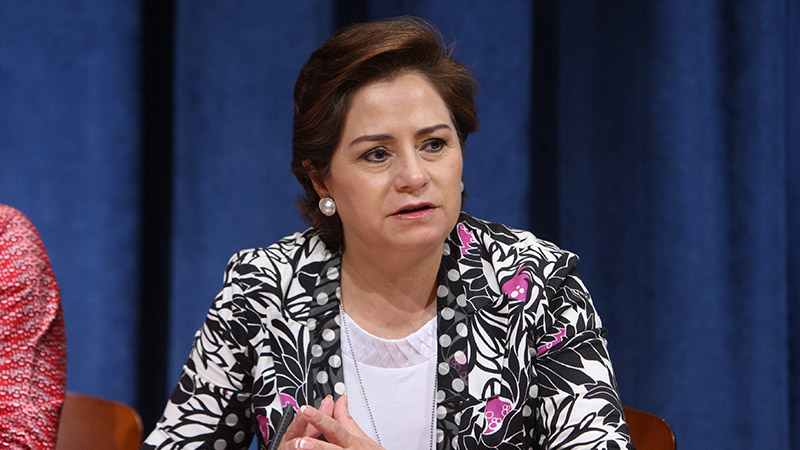The UN climate chief is urging countries to adopt an ambitious initial strategy to curb shipping emissions at the International Maritime Organization (IMO) this week.
“We are witnessing how climate change is moving much faster than emissions reductions,” said Patricia Espinosa before the IMO plenary met in London on Monday. “I call upon all nations to adopt an ambitious initial strategy at the IMO that can critically contribute towards achieving the Paris Agreement goals, and at the same time be supportive of the sector’s sustainability.”
International shipping and aviation are not directly covered by the 2015 Paris climate pact, which is based on national efforts. The sector’s greenhouse gas emissions contribute to global warming, however, and will affect the goal to hold the temperature rise “well below 2C”.
Shipping has a carbon footprint the size of Germany’s. Without intervention, its emissions are expected to grow 50-250% by 2050, as trading volumes increase.
European and Pacific island states are calling on the sector to slash emissions 70-100% from 2008 levels by 2050. Major emerging economies led by Brazil are fighting a cap on emissions, citing fears this could inhibit trade and development.
In a closed meeting last week, a working group produced a draft text (below) that compromised on a 50% emissions cut by 2050. Observers were nervous the talks could go either way ahead of this Friday’s deadline for reaching agreement.
EU climate commissioner Miguel Arias Cañete and transport commissioner Violeta Bulc wrote to ministers of member states asking them to support a tougher target.
The letter, tweeted by Cañete on Monday, said 70-100% cuts “should be feasible and would correspond to an adequate contribution from the shipping sector [to the Paris Agreement]”.
He added on Twitter the EU was “counting on major partners” such as China, Brazil and the US to “push a good deal through”.
#MEPC72 : Continuing my strong engagement w/ many stakeholders at #IMO. Together, we must deliver an ambitious strategy in terms of emission reduction objectives for shipping sector. Inaction is not an option. #ParisAgreement (Pic w/ reps of #MarshallIslands #Panama #industry) pic.twitter.com/Gf8hxf4XF2
— Violeta Bulc (@Bulc_EU) April 9, 2018
A Brazilian official told Climate Home News by WhatsApp “we are still greatly concerned with the section on level of ambition” in the initial climate strategy. The country was “willing to engage in conversations” on a target that would cut the emissions of the sector relative to its activity, the official said, but he would not comment on the prospect of an absolute emissions cut.
David Paul, environment minister of the Marshall Islands, said in opening remarks at the IMO he would work with negotiators to improve the draft text.
“There are very many things in it we do not like, and things missing from it that we could not even discuss last week,” he said. “At the same time, we must all recognize that unless we work with the current text as a package, we risk having no outcome at all. We have all travelled far together. We need to take the final steps.”
The Marshall Islands, a low-lying island state, is acutely vulnerable to the sea level rise and intensifying tropical storms that come with global warming.
“In the next days in IMO will determine whether Marshallese children born today will have the chance of a secure and prosperous life or will have to leave the land of their ancestors and set sail across the oceans to an uncertain future,” said Paul.
